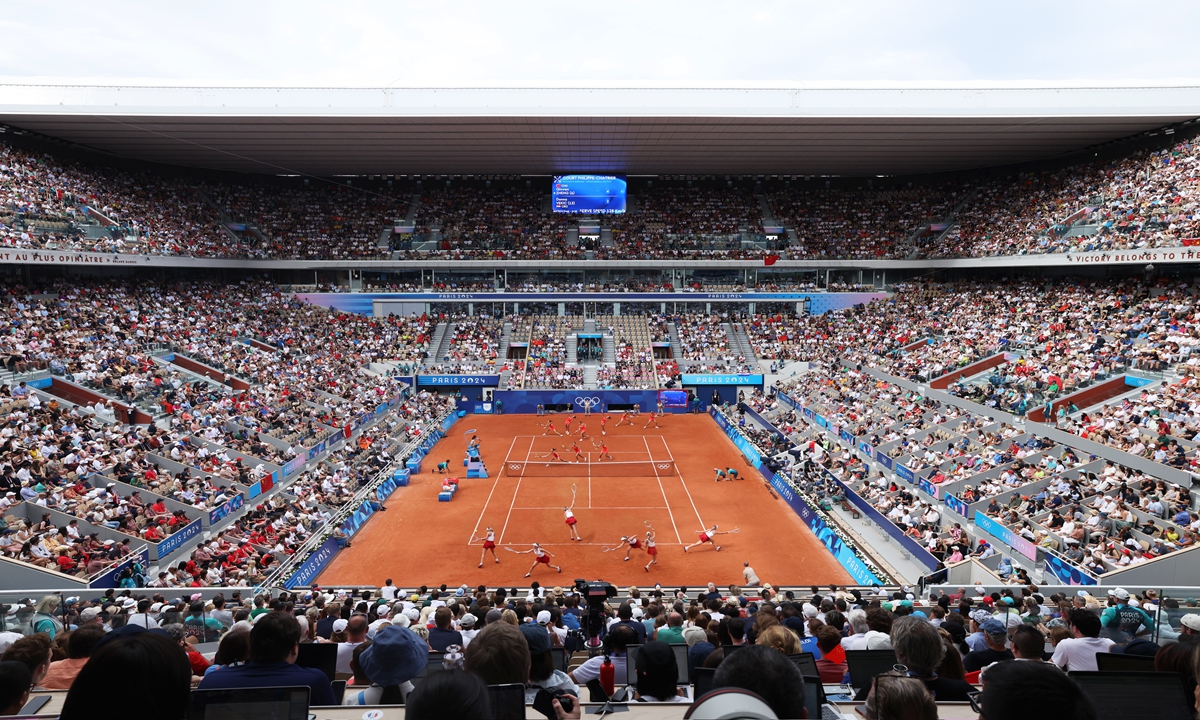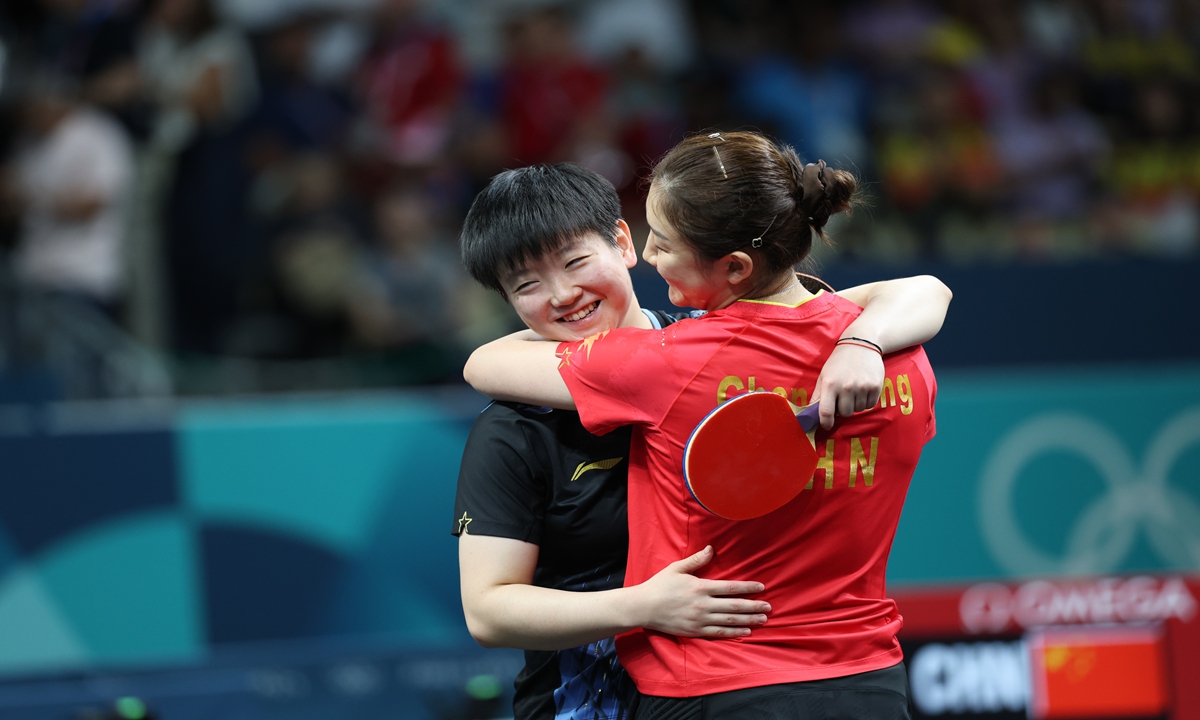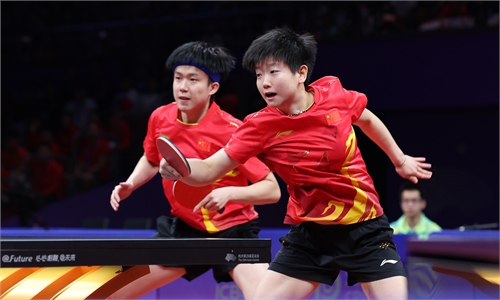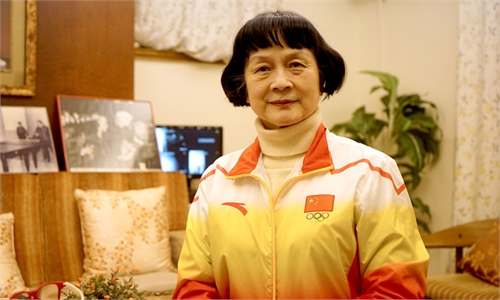IN-DEPTH / IN-DEPTH
Distorted fan culture erodes sports community, sparking concern and reflection among the public
Love over partiality

Spectators watch the women's tennis singles final in Paris, on August 3, 2024. Photo: VCG
As the performance of Team China at the Paris 2024 Olympics continues to grab headlines on Chinese social media, a debate is brewing in the country about the evolution of fan culture in the sporting field.
On August 4, several of China's social media platforms, such as Sina Weibo and Douyin announced that they were cracking down on over 800 accounts that had been spreading negativity and fomenting conflict during the table tennis events at the Olympics, removing more than 50,000 inappropriate fan posts.
This action was taken after an event on August 3, when Chinese paddler Chen Meng defeated her teammate Sun Yingsha 4-2, to win the table tennis women's singles gold medal at the Paris 2024 Olympics, with numerous fans showing favoritism toward Sun while booing Chen.
During the match, the stands at the South Paris Arena were filled with cheers for Sun, and there were even jeers when Chen scored points. On the internet, the battle of insults started at the commencement of the match, when some fans posted inflammatory comments attacking the athletes and coaching staff.
This phenomenon has caused numerous Chinese people to worry about the visibly aggressive fan culture that threatens to erode the sporting world.
"Fan culture" is a subculture that originated in the entertainment industry and is based on idol artists and fan economics. With the vigorous development of the Chinese sports industry, sports stars are becoming more influential as role models. However, some fans are taking things too far by turning sporting events into battlegrounds. They attack athletes online, inciting public emotions to increase exposure and attention. The arbitrary and relentless hounding of athletes by some fans off the field also presents a series of problems for athletes' normal training and personal lives.
Where does this aggressive fan culture come from? What do these fans hope to achieve? Is this really representative of Chinese sports fans as a whole? These are questions that are being raised as the debate continues.

Chinese player Chen Meng (right) and Sun Yingsha embrace after the match at the women's singles table tennis final at the Paris 2024 Olympics on August 3, 2024. Photo: VCG
Chaos abounds"I wish Chen tests positive for a banned substance, then the gold medal can go to our Shasha (Sun's nickname)," one of Sun's extreme fans wrote online after the match. The inflammatory post soon caused widespread anger on both Chinese and international social media platforms, with many calling her "brainless."
"In that match, Sun was the biggest victim of her irrational fans," commented Zhang Fan, an associate professor at the School of Journalism and Communication, Shanghai University of Sport. She criticized the "fans" who kept cheering for Sun while booing her rival Chen, saying their impolite behaviors didn't do Sun any justice, but rather embarrassed and stressed her on the court.
In China, this voracious fan culture spread to the competitive sporting field during the Rio 2016 Olympics, according to Zhang. This unedifying "culture" quickly developed in the proceeding years and gave rise to many fan groups similar to those in the K-pop entertainment industry, Zhang explained.
China's Olympic table tennis champion Ding Ning will never forget August 20, 2016. On that day, the Chinese table tennis team returned home from the Rio 2016 Olympics with an impressive haul of four gold medals and two silver medals. As the team members arrived at the Beijing Capital International Airport, they were greeted by a throng of excited fans. "We were truly amazed by the outpouring of support from the fans at the airport. It was a sight we had never seen before," Ding told the Global Times in a previous exclusive interview.
The Global Times found that leading up to the Rio 2016 Olympics, it was rare to see more than a few dozen fans gathered at the airport to welcome national teams home. The majority of the crowd usually consisted of journalists, with only a handful of supporters present.
However, following the Rio 2016 Games, athletes from various sports, such as table tennis, women's volleyball, diving, and swimming, began to attract a larger following. Fans who previously had little interest in sports started to show their support. In particular, table tennis, which is considered the national sport of China, saw its fan base grow exponentially.
However, the chaotic growth trajectory within some Chinese sports fan communities from 2016 to 2024 reveals several key issues, particularly the extreme behaviors exhibited by fans.
Leading fans control comments and initiate scolding battles on social media, manipulating comment sections and attacking other athletes, referees, clubs, national teams, and governing bodies, which leads to fierce conflicts between different fan groups.
CP fans, who pair athletes or public figures as "couples" or "combinations," create specific fan organizations. They share related photos and videos on social media, flood comment sections with their views, and even write fan fiction, severely impacting the viewing experience of other fans and athletes, and causing undue stress to the athletes involved.
Additionally, the act of proxy photographing and privacy violations is prevalent, where individuals sell athletes' personal information and capture photos or videos of athletes at airports, hotels, training grounds, and competition venues, which are then sold publicly on social media. This seriously infringes on the athletes' privacy.
The sale of signed memorabilia is another issue, with fans haranguing athletes in public places to obtain signatures, later selling these signed items on second-hand trading platforms, with items for sale ranging from autographed photos to signed paddles.
Overzealous support also disrupts competitions, with fans causing disturbances through loud cheering and flash photography during matches, affecting athletes' performances.
These chaotic phenomena not only disrupt athletes' regular training and competitions but also damage the harmonious atmosphere among the athletes.
Fandom distortion
"In China, there used to be a perfect balance between athletes and sports fans where their distance and interaction was 'just right,'" 30-year-old table tennis enthusiast Wu Aichen told the Global Times.
Wu became a fan of Ding Ning after the London 2012 Olympics, and joined the fan group called "Ding Dang," which she believes was one of the earliest fan groups in the Chinese table tennis community.
"Back then, we mainly communicated and connected through QQ chat groups. Our group gradually released fan merchandise like calendars, mostly funded by the fan club leaders. They helped us secure complimentary tickets for the China Table Tennis Super League, and after the games, we could approach the athletes in the fan zone for autographs and photos in an orderly way," Wu recalled.
After the Rio 2016 Olympics, driven by her love for table tennis, Wu also joined other table tennis players' fan groups, where she noticed a change in the nature of these organizations.
"In the beginning, most table tennis fan groups were spontaneous, with no formal organization or decision-making process. But later, there were more leaders in the fan base, and the division of labor became more detailed. The leader became more aggressive in encouraging everyone to buy idol-related cultural products and would push fans to vote on various rankings to attract advertisers for their athletes," Wu observed.
Wu pointed out that most of the active fans of the Chinese table tennis team are young people, particularly teenagers. "This generation of fans sees their idols' growth as a form of self-realization. Idols represent the fans' own aspirations, fulfilling their self-image," she noted.
Zhu Wei, a vice director of the Communication Law Research Center at the China University of Political Science and Law, introduced that China's fan community has now experienced a phenomenon of "breaking the circle," meaning it is no longer confined to the cultural sphere but has extended to all areas.
"This is accompanied by a highly aggressive online environment. The fan community has also trended younger, with various chaotic phenomena emerging," Zhu told the Global Times.
These fans feel a sense of duty that "the idol needs me," constantly creating discussions, and investing to boost the market value of sports stars, hoping to elevate their favorite athletes to the top of the sports fan community, Wu said, also noting that they are not sporting event enthusiasts but just fans.
What are the differences between ordinary sporting event enthusiasts and irrational "fans?" Zhang explained that the unwelcome "fans" are those who unconditionally boast and defend their favorite players, making all sorts of excuses for their failures - even resorting to insulting other players.
"These behaviors have seriously contradicted the open and inclusive spirit of sports," Zhang noted.
Return to reason and faith
"During the current Olympics, the young athletes have actually set a good example for teenagers and young people. They inspired young viewers to put down their video games, develop a love for sports, and foster a sense of patriotism. This is a very positive development," Zhu said.
Facing the surging popularity of table tennis, Ding expressed that what athletes always care most about is their performance in competition. "We speak only with our event results, not exposure."
Conversely, this is a gratifying thing that China's youth are no longer satisfied with idolizing entertainment stars, but are pursuing higher, faster, and stronger quality idols, Wu said.
To some extent, the spread of fan culture in China's competitive sporting field does have a few benefits, such as boosting the promotion of some sports among the young generations, bringing them vitality and more attention, said Zhang.
"But the disadvantages of 'fan culture' far outweigh the benefits." Zhang stressed that the unhealthy "fan culture" harms the atmosphere of competitive sports.
In recent years, China has been trying to curb the spread and intensification of fan community culture.
In May, the General Administration of Sport of China stated that the national sports system will resolutely resist the erosion caused by abnormal fan culture in the sporting field throughout the whole process, stressing that sports should not become the "lead" and "hotbed" for abnormal fan culture to continue to proliferate.
In 2021, the Chinese Olympic Committee called on fans to respect athletes' rights and avoid improper behavior toward them, and resolutely oppose the use of fandom to engage in profiteering activities.
Fortunately, Wu noted that now, in the fan communities of various table tennis athletes, most people are looking at the controversy on the Olympic stage objectively and rationally.
"'Focus on the competition and have rational discussions' is the most frequently mentioned phrase in fan communities now. We can all agree that when athletes are showcasing the Olympic spirit and national honor at their peak. They should not be degraded through irrational fan behaviors," she said.
Wu believes that in the future, more fans will respect the sweat that each athlete puts in, willing to experience the pure charm that comes from sports and show the good qualities of Chinese audiences.


